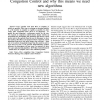Free Online Productivity Tools
i2Speak
i2Symbol
i2OCR
iTex2Img
iWeb2Print
iWeb2Shot
i2Type
iPdf2Split
iPdf2Merge
i2Bopomofo
i2Arabic
i2Style
i2Image
i2PDF
iLatex2Rtf
Sci2ools
CCR
2006
2006
Why flow-completion time is the right metric for congestion control
Users typically want their flows to complete as quickly as possible: They want a web-page to download quickly, or a file transfer to complete as rapidly as possible. In other words, Flow Completion Time (FCT) is an important - arguably the most important - performance metric for the user. Yet research on congestion control focuses almost entirely on maximizing flow throughput, link utilization and fairness, which matter more to the operator than the user. In this paper we show that existing (TCP Reno) and proposed (XCP) congestion control algorithms make flows last much longer than necessary - often one or two orders of magnitude longer than they need to; and we argue that over time, as the network bandwidth-delay product increases, the discrepancy will get worse. In contrast, we show how a new and practical algorithm - RCP (Rate Control Protocol) - enables flows to complete close to the minimum possible.
| Added | 11 Dec 2010 |
| Updated | 11 Dec 2010 |
| Type | Journal |
| Year | 2006 |
| Where | CCR |
| Authors | Nandita Dukkipati, Nick McKeown |
Comments (0)

